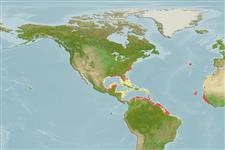分類 / Names
共通名の | 類義語 | Catalog of Fishes(部類, 種) | ITIS | CoL | WoRMS | Cloffa
Environment: milieu / climate zone / depth range / distribution range
生態学
海; 汽水性の 底生の漂泳性; 海洋回遊性 (Ref. 51243); 深さの範囲 0 - 22 m (Ref. 26912). Tropical; 46°N - 42°S, 98°W - 33°W
Western Atlantic: from New England (USA) to northern Argentina (Ref. 114953); including northern Florida (USA), throughout the Gulf of Mexico, migrating to Trinidad, Venezuela, Brazil and Uruguay (Ref. 7251).
Length at first maturity / サイズ / 重さ / 年齢
Maturity: Lm 65.3, range 62 - ? cm
Max length : 120 cm WD オス/雌雄の選別がない; (Ref. 5217); 最大公表体重: 953.00 g (Ref. 118626)
簡単な記述
検索表 | 形態学 | 形態計測学
Deep grove around front of head below eyes; forehead above groove indented, snout below groove is distinctly bilobed (Ref. 26938). Disk brown to olive above, with no spots or marks, wings long and pointed (Ref. 7251). Lower surface white or yellowish white (Ref. 6902).
A benthopelagic species found on continental and insular shelves; enters bays and estuaries; forms huge schools inshore (Ref. 114953). Feeds mainly on benthic invertebrates and molluscs (implicated in damaging seagrass beds) (Ref. 93252, 114953). Jumps occasionally, landing with a loud smack, probably as a territorial display. Migrates south in large schools that disappear off northern Florida, USA and are not reported from Caribbean Is.; tagged fish have been recovered in northern South America (Ref. 7251). Population in the Gulf of Mexico migrates clockwise; schools of up to 10,000 rays leave west coast of Florida for Yucatan, Mexico in the fall (Ref. 7251). Ovoviviparous (Ref. 50449).
Life cycle and mating behavior
成熟 | 繁殖 | 放精 | 卵 | 生産力 | 幼生
Exhibit ovoviparity (aplacental viviparity), with embryos feeding initially on yolk, then receiving additional nourishment from the mother by indirect absorption of uterine fluid enriched with mucus, fat or protein through specialised structures (Ref. 50449).
Last, P.R., W.T. White, M.R. de Carvalho, B. Séret, M.F.W. Stehmann and G.J.P. Naylor, 2016. Rays of the world. CSIRO Publishing, Comstock Publishing Associates. i-ix + 1-790. (Ref. 114953)
IUCNのレッドリストの状況は (Ref. 130435: Version 2024-1)
人間に対する脅威
Traumatogenic (Ref. 4690)
Human uses
水産業: 少数商業の; 水族館・水槽: 公共の水族館
用具
特記事項
XMLをダウンロードして下さい
インターネットの情報源
Estimates based on models
Preferred temperature (Ref.
123201): 20 - 28.1, mean 26.7 °C (based on 643 cells).
Phylogenetic diversity index (Ref.
82804): PD
50 = 0.5039 [Uniqueness, from 0.5 = low to 2.0 = high].
Bayesian length-weight: a=0.01202 (0.00696 - 0.02076), b=2.98 (2.82 - 3.14), in cm total length, based on LWR estimates for this species & (Sub)family-body (Ref.
93245).
栄養段階 (Ref.
69278): 3.2 ±0.0 se; based on diet studies.
回復力 (Ref.
120179): 低い, 4.5年~14年の倍増期間の最小個体群 (Fec assumed to be <100).
Fishing Vulnerability (Ref.
59153): High vulnerability (59 of 100).
